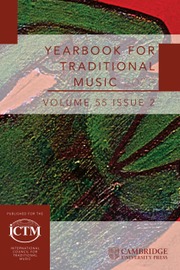Article contents
Samulnori, Wőrn-pang-kak, and Cosmological Didacticism
Published online by Cambridge University Press: 07 March 2019
Extract
Through scientific understanding, our world has become de-humanized. Man feels himself isolated in the cosmos. He is no longer involved in nature and has lost his emotional participation in natural events, which hitherto had a symbolic meaning for him. Thunder is no longer the voice of a god, nor is lightning his avenging missile. No river contains a spirit, no tree means a man's life, no snake is the embodiment of wisdom, and no mountain still harbors a great demon … His immediate communication with nature is gone forever, and the emotional energy it generated has sunk into the unconscious. (Jung 1976:255)
At the heart of the resurgence and popularity of traditional music in South Korea during the closing decades of the twentieth century lie the concerted efforts of an intimate group of friends and musical colleagues who came of age in the late 1970s. Inspired by their mentors and artistic forbearers borne of itinerant troupe performance traditions and bound together by the common goal of saving Korean music from obscurity in a nation that was catapulting itself toward Western cultural hegemony, the percussion quartet known as SamulNori emerged from its humble beginnings to become an internationally acknowledged phenomenon.

- Type
- Articles
- Information
- Copyright
- Copyright © 2007 by the International Council for Traditional Music
References
References Cited
- 1
- Cited by


